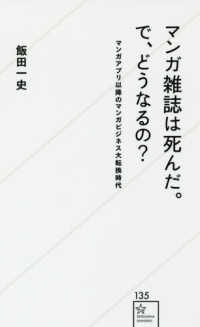- ホーム
- > 洋書
- > 英文書
- > Psychology
Full Description
The "belief in a just world" is an attempt to capmre in a phrase one of the ways, if not the way, that people come to terms with-make sense out of-find meaning in, their experiences. We do not believe that things just happen in our world; there is a pattern to events which conveys not only a sense of orderli ness or predictability, but also the compelling experience of appropriateness ex pressed in the typically implicit judgment, "Yes, that is the way it should be." There are probably many reasons why people discover or develop a view of their environment in which events occur for good, understandable reasons. One explanation is simply that this view of reality is a direct reflection of the way both the human mind and the environment are constructed. Constancies, patterns which actually do exist in the environment-out there-are perceived, represented symbolically, and retained in the mind. This approach cenainly has some validity, and would probably suffice, if it were not for thatsense of "appropriateness," the pervasive affective com ponent in human experience. People have emotions and feelings, and these are especially apparent in their expectations about their world: their hopes, fears, disappointments, disillusionment, surprise, confidence, trust, despondency, anticipation-and certainly their sense of right, wrong, good, bad, ought, en titled, fair, deserving, just.
Contents
1. The Belief in a Just World.- 2. The First Experiment: The Effect of Fortuitous Reward.- 3. The Second Experiment: Observers' Reactions to the "Innocent Victim".- 4. The Third Experiment: The Martyred and Innocent Victims.- 5. Three Experiments That Assess the Effects of Sex and Educational Background of Observers, Experimenter and Observer Influence on One Another, and the Reactions of "Informed" and Nonimplicated Observers.- 6. Reactions to the Belief in a Just World Theory and Findings: The "Nay-Sayers".- 7. Condemning the Victimized.- 8. The Assignment of Blame.- 9. The Response to Victimization: Extreme Tests of the Belief in a Just World.- 10. Who Believes in a Just World: Dimension or Style.- 11. Deserving versus Justice.- References.







